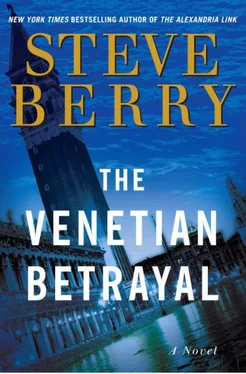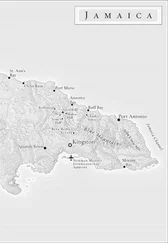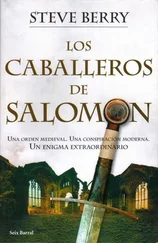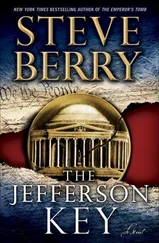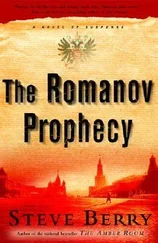Thorvaldsen nodded. “I wanted it to look like it once did. Too much history in this building to be blown away by fanatics.”
“Want to get out of those damp clothes?” Malone asked her.
“Shouldn’t we send Henrik home first?”
Malone grinned. “I hear he likes to watch.”
“Sounds intriguing,” Thorvaldsen said. “But tonight I’m not in the mood.”
Neither was she. “I’m fine. Leather dries quickly. One reason I wear it when I’m working.”
“And what were you working on tonight?”
“You sure you want to hear this? Like you say all the time, you’re a bookseller, not an operative. Retired, and all those other excuses.”
“You sent me an e-mail telling me to meet you at that museum in the morning. With what you said back at the fire, there wouldn’t have been any museum there tomorrow.”
She sat in one of the club chairs. “Which is why we were going to meet there. Tell him, Henrik.”
She liked Malone. He was a smart, confident, handsome man-she’d thought that when they first met last year in France. A uniquely trained lawyer. Twelve years he worked for the U.S. Justice Department in a covert unit known as the Magellan Billet. Then, two years ago, he opted out and bought a bookshop from Thorvaldsen in Copenhagen. He was plain spoken and sometimes rough in manner, just like her, so she couldn’t complain. She liked his animated face, that malicious twinkle in his bright green eyes, his sandy-colored hair, and the always-swarthy complexion. She knew his age, mid-forties, and realized that, thanks to a bloom of youth that had yet to fade, he was at the zenith of his charms.
She envied him.
Time.
For her, it seemed in such short supply.
“Cotton,” Thorvaldsen said, “across Europe there have been other fires. They started in France, then in Spain, Belgium, and Switzerland. Similar to what you just experienced. The police in each location realized arson but, so far, none of them have been connected. Two of the buildings burned to ash. They were in rural locations and nobody seemed to care. All four were unoccupied private residences. The one here was the first commercial establishment.”
“And how did you connect the dots?” Malone asked.
“We know what they’re after,” she said. “Elephant medallions.”
“You know,” Malone said, “that’s exactly what I was thinking. Five arsons. All across Europe. Has to be elephant medallions. What else could it be?”
“They’re real,” she said.
“Nice to know, but what the hell is an elephant medallion?”
“Twenty-three hundred years ago,” Thorvaldsen said, “after Alexander the Great conquered Asia Minor and Persia, he set his sights on India. But his army quit him before he could take much of that land. He fought several battles in India and, for the first time, encountered war elephants. They crushed the Macedonian lines, wreaked havoc. Alexander’s men were terrified of them. Medallions were later struck to commemorate the event, which depicted Alexander facing off with the elephants.”
“The medallions,” she said, “were minted after Alexander’s death. We have no idea how many, but today only eight are known. The four already taken, the one from tonight, two more in private hands, and one on display in the Museum of Cultural History in Samarkand.”
“The capital of the Central Asian Federation?” Malone said. “Part of the region Alexander conquered.”
Thorvaldsen slouched in one of the club chairs, his crooked spine cocking his neck forward and settling his fleshy chin onto a thin chest. Cassiopeia noticed that her old friend looked worn. He wore his customary baggy sweater and oversized corduroy trousers. A uniform he used, she knew, to conceal the deformity. She regretted involving him, but he’d insisted. He was a good friend. Time to see how good a friend Malone was. “What do you know about the death of Alexander the Great?”
“I’ve read about it. Lots of myth mixed with conflicting facts.”
“That eidetic memory of yours?”
He shrugged. “It came with me out of the womb.”
She smiled. “What happened in June 323 BCE made a great deal of difference to the world.”
Thorvaldsen gestured with his arm. “Go ahead. Tell him. He needs to know.”
So she did.
On the final day of May, within the walls of Babylon, Alexander attended a dinner given by one of his trusted Companions. He pledged a toast, drank a large cup of undiluted wine, then shrieked aloud as if smitten by a violent blow. He was quickly taken to bed where a fever came, but he continued to play dice, plan with his generals, and make the proper sacrifices. On the fourth day he complained of weariness and some of his Companions noticed a lack of his normal energy. He lay quiet for several more days, sleeping in the bathhouse for coolness. Despite his weakened condition, Alexander sent word to the infantry to be ready to march in four days and for the fleet to sail in five. His plans to move west and take Arabia were about to unfold. On June 6, feeling weaker, he passed his ring to Perdiccas so the proper administration of the government could continue. This caused a panic. His troops feared he’d died and, to calm their unease, Alexander allowed them to file past his bed. He greeted each one with a smile. When the last man left he whispered, “After my death, where will you find a king who deserves such men?” He commanded that, after his death, his body should be taken to the Temple of Ammon in Egypt. But none of the Companions wanted to hear such fatalism. His condition worsened until, on June 9, his Companions asked, “To whom do you leave your kingdom?” Ptolemy said he heard, “to the brightest.” Seleucus said, “to the righteous.” Peithon recalls, “to the strongest.” A great debate ensued as to who was right. Early during the morning of the next day, in the thirty-third year of life, twelve years and eight months into his reign, Alexander III of Macedonia died.
“People still debate those last words,” she said.
“And why is it so important?” Malone asked.
“It’s what he left behind,” Thorvaldsen said. “His kingdom, with no rightful heir.”
“And that has something to do with elephant medallions?”
“Cotton,” Thorvaldsen said, “I bought that museum knowing someone would destroy it. Cassiopeia and I have been waiting for that to happen.”
She said, “We had to stay a step ahead of whoever is after the medallions.”
“Seems like they won. They have the thing.”
Thorvaldsen cast her a look, then the older man stared at Malone and said, “Not exactly.”
VIKTOR RELAXED ONLY WHEN THE DOOR TO THE HOTEL ROOM was closed and locked. They were across Copenhagen, near Nyhavn, where boisterous waterfront cafés catered to rowdy patrons. He sat at the desk and switched on a lamp as Rafael assumed a window position, which overlooked the street four stories below.
He now possessed the fifth medallion.
The first four had been disappointments. One was a forgery, the other three in poor condition. Six months ago he knew little about elephant medallions. Now he considered himself quite proficient in their provenance.
“We should be fine,” he said to Rafael. “Calm down. No one followed us.”
“I’ll keep watch to be sure.”
He knew Rafael was trying to make amends for overreacting in the museum, so he said, “It’s okay.”
“He should have died.”
“It’s better he didn’t. At least we know what we’re facing.”
He unzipped a leather case and removed a stereomicroscope and digital scale.
He laid the coin on the desk. They’d found it displayed in one of the museum cases, correctly noted as an “Elephant Medallion (Alexander the Great), a decadrachm, circa second century BCE.”
Читать дальше
